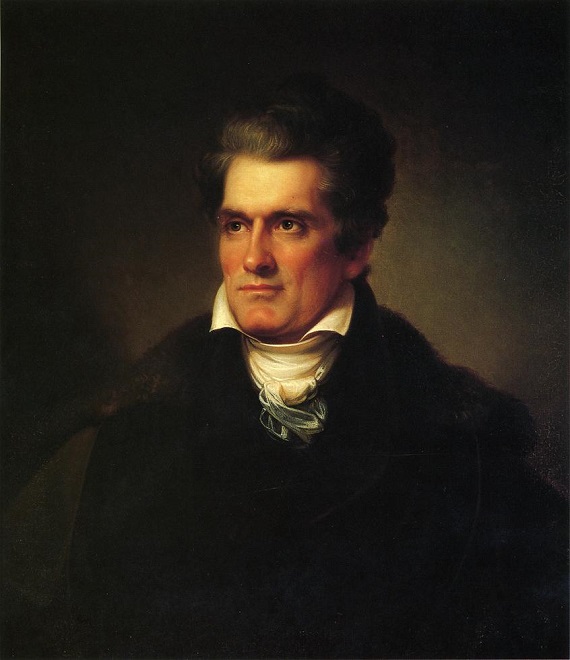The spring of 1850 is an ominous perpetrator. Notwithstanding the crisis our country faced during those trying years leading to the so-called compromise of 1850, March 31st marks the death of one of our most favorable and forbearing men in our history, John C. Calhoun. Calhoun had always been a man of great vigor and zeal, uncompromising in his approach to government and politics. Such admirable characteristics led to great achievements during his political career. His stance on nullification, his Disquisition on Government (a great and significant undertaking of the role of government and its constitutions), and his love for the South and its sheltered defense of overarching federal structures are all examples of the tremendous exploits the man championed as his cause for political existence. Such a man can never be forgotten. It is incumbent upon not only my own generation, but for those which will come, to bear out his name and impress his legacy in our own history, here, in this time and of the times to come.
How can we uphold a legacy so important to our culture as Southerners? What is the magnitude of the task we are challenged with? These are questions we must ponder and discuss, as the days of old can never wither in the past but rather can be determined in regards as to how they will be remembered. Our task is simple, we must educate. But first, we must educate ourselves. We must read his works, take notes, engage in healthy debate, and apply what we have learned from our fallen Southern ancestors in our daily lives. We must join the hands of government and southern culture, all the while embracing the necessity of our due diligence towards the ends of such a tandem. We must ensure that our posterity is well informed, and battle tested, ready to withstand the perpetually elevating uphill battle which they shall ascend each day in a world set against them.
Simple are these that are listed, but with each listing their level of difficulty and burden escalates, as though the weight of such objects seem to crush the spirit and render defeat. We must withstand this weight and be slow to relinquish our resolve as Southerners. Calhoun was relentless in his efforts to protect Southern interests, our economy, our institutions, our culture. He was a man of great resolve and great disdain to Yankee governance through financial machinations and state capitalism. And this is how we shall immortalize his legacy, through great care and intensity, matching that of his political will. We shall not be careless with our responsibilities to maintain our Southern heritage. We must be bold and create symbols which reflect it, symbols future generations will recognize and uphold. There may be times when failure seems eminent, but this shall not be what defines our movement. We will not be crushed and erased from existence.
The essayists in I’ll Take My Stand took it upon themselves to mark history with their perspective, their ideas, their agrarian culture. It is now left to us to pick up where they left off, to continue the legacy of the South and that of Calhoun. Idleness is no option for the contemporary Southerner; an idle man is complicit and pregnant with regret, while the man who engages society with uncompromising rigor shall earn the honor of remembrance.
In a letter to William Murray in July of 1832 written to the Free Trade and State Rights Party of St. Johns, Calhoun stated that, “it is in the order of Providence, that a good cause, worthily sustained, never fails in the end to prosper; and we accordingly find, that ours has advanced in spite of every difficulty, ‘till it is now so well understood and so firmly established as to be placed beyond the reach of contingencies, if we but preserve, as we have begun.” Our cause is worthy and noble, our principles are unshakable and everlasting. The concealment of these is detrimental to the survival of our kind and leaves us vulnerable and docile to the prevailing cultures which have enveloped the world. A letter penned in the same year has Calhoun writing to Samuel Ingham in May has him espousing that “as a publick man, I have but one wish, to restore the country to the sound condition, it formerly was in; and to effect this great object, am prepared for any sacrifice.” This is our final task; to further the Southern tenets bestowed upon our birthright, we must be willing to make sacrifices and place purpose over pleasure.
Calhoun was the renegade progenitor of Southern mores. His wisdom was beyond his years, as well as was his patrimony. Remembrance of his works and political genius is paramount to the continuance of our Southern traditions. The history of the South lingers in our present and it is our duty to exploit its righteousness, this way the upholstery of Calhoun’s legacy shall never be in question.







